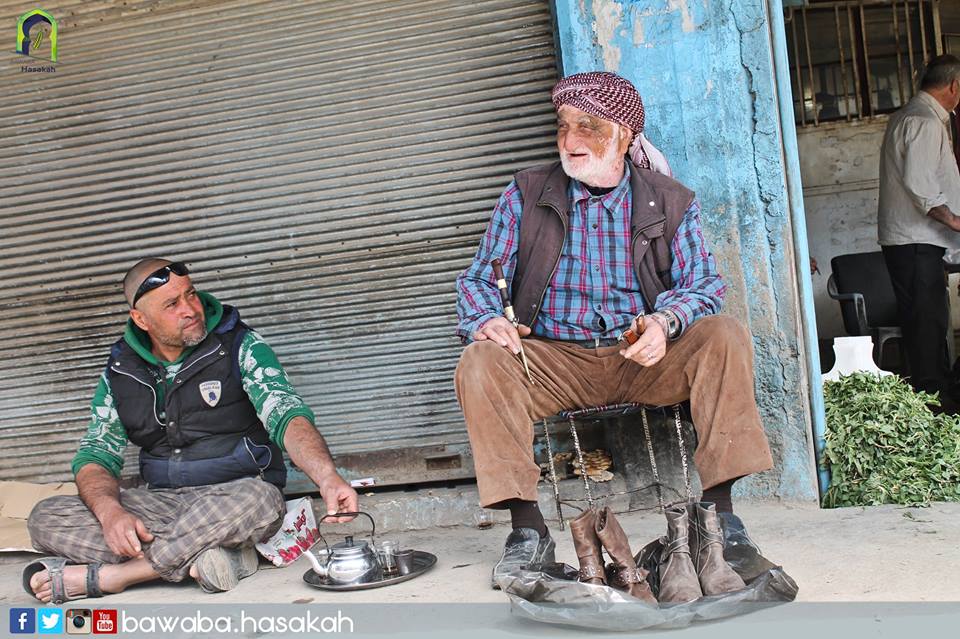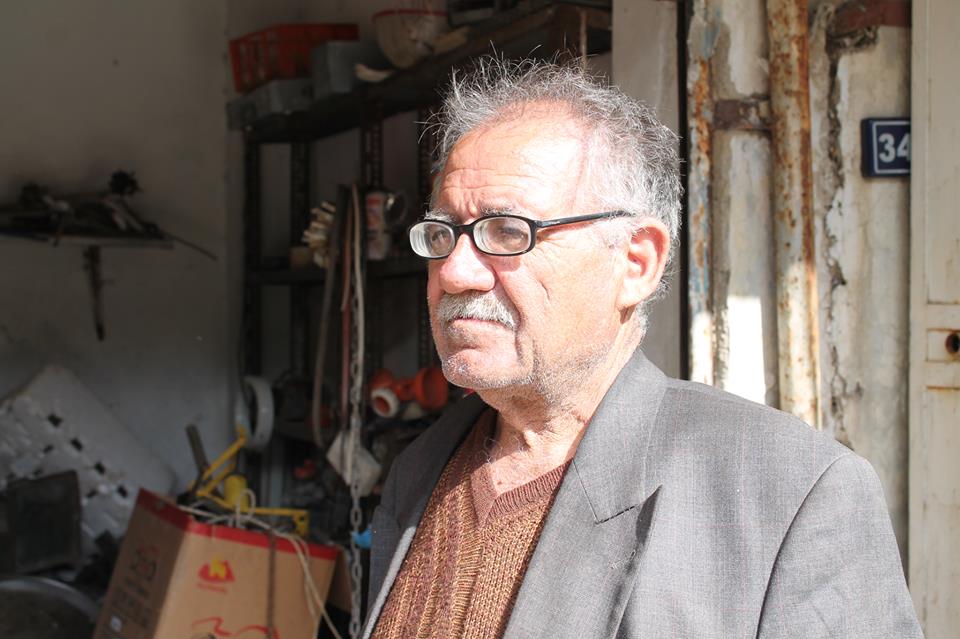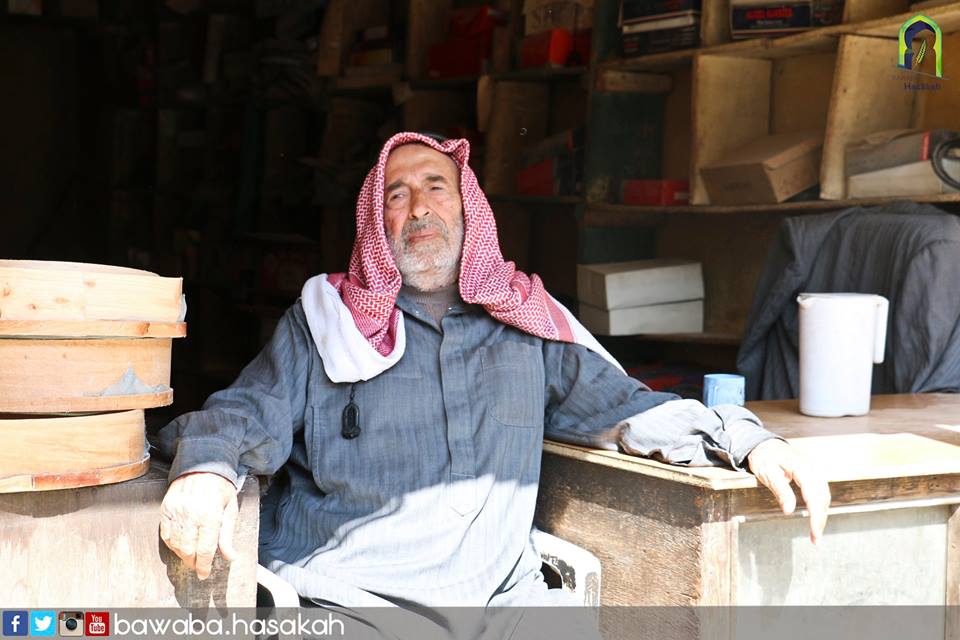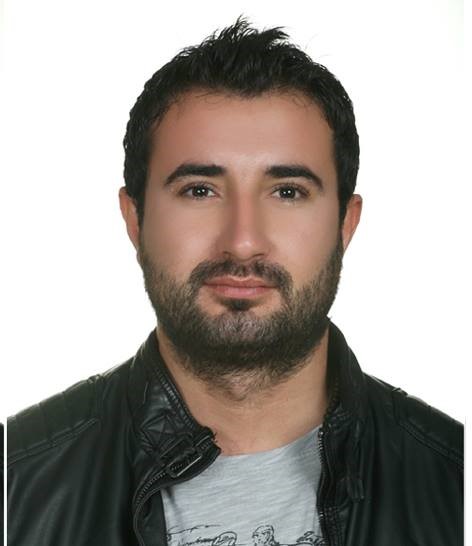(Al-Qamishli) In their own way, the people in the rural areas of the Al-Hasakah governorate have managed to establish commercial trademarks that have often taken on and became synonymous with the surname or popular nickname of the shop owner. So much so that it became common to find a certain commodity that usually goes by the name of the shop.
Many men who have reached the age of retirement in the governorate often find themselves without any guarantees and receive no government support after being productive citizens for many years in an economically marginalized area. Yet these men are dedicated to their work and adamantly open up their shops everyday, despite the fact that their little establishments have become long forgotten and offer little in terms of modern day goods.
Of the many stories we can share, one story comes from the border town of Amuda, located 60 km north of the city of Al-Hasakah. In the late nineties, a certain type of sunflower seed became so popular that it started going by the surname of the shop owner, Dello. It might have been that the shop owner was the first to sell this specific type of seed in the market.
And so it goes that the town people would ask for “Dello seeds” even when purchasing their goods from other shops. So popular it became, that the other shop owners started using the same name when ordering their seed shipments from suppliers in big cities.
Years have passed since, and Mr. Dello has grown old. His goods have greatly decreased, and today, it is only by chance that a customer would walk into his shop. Surrounded by scattered boxes on empty and decaying shelves and some bags of nuts, Dello sits with his friends drinking tea, leaning on a big bag of seeds. Everyone agrees that Dello seeds are in the bag, even though demand dwindled years ago.

He insists that he has to open the shop very early before the buses arrive carrying shoppers from the surrounding villages. “They are active and get up early for the long day ahead,” he explains.
Hajj Karim sells manual building equipment, a job he’s been doing since the eighties. Most builders in the area know Hajj Karim, but they -- like the Hajj’s merchandise -- have dwindled. He admits that while profits have noticeably dropped, he refuses to rent out his shop to young investors who have approached him several times.
In his efforts to face his financial setback, Hajj Karim started selling local olives in limited quantities on the side. You would often see him taking his time with clients. “I don’t consider them as customers, but as friends. Some of then used to come as children to the shop with their fathers,” he says.
Hajj Karim doesn’t recall the last time he bought new merchandise for his shop, as he is fully aware of the decreasing demand on manual building equipment in light of the new and modern tools available to builders nowadays. He jokingly says: “This shovel could very well be as old as I am, but I’m determined to sell it before I die.”
The Hajj is also aware of his family’s stand regarding the shop given its prime location. “My eldest son is in Germany and he’s been trying to convince me of retiring and handing over the shop to his younger brother. That’s fine. But what would I do with myself?” he asks.
Yet his concern is natural given that the culture of retirement doesn’t exist in the Jazirah society in general, but more specifically, among that generation. This culture can only be introduced and ingrained by the state after it legally supports it and offers protection to workers along the stages of their careers, including retirement as a subsequent stage of productivity. But this is exactly what the Baath state in Syria did not do, the so-called “workers’ state”(dawlat al-aydi al-amelah), except in a very limited scope and in a way lacking of many social insurances that ought to be in place.
In Al-Qamishli, Issa Ahmad Al-Khatib, a former employee at the state-run Al-Hasakah Electricity Directorate in his seventies, opened a shop to fix electrical gadgets after he had been forced to retire. After 35 years of service, there is no union or civil organization to support him and his family. “The retirement salary doesn’t cover the price of bread,” he says. He gets the equivalent of $20 a month from the regime-controlled directorate.
This meager stipend is subject to the winds of change between the regime and the [Kurdish] Democratic Autonomous Administration (DAA), which means, Al-Khatib could easily not receive his stipend for several months.

As the sun moves to the west and prepares to set, Abdul Baqi Al-Huseini – a man in his seventies - sits with his friends in front of his shop to recount past stories.
A tailor of traditional men’s wear, Al-Huseini tells SyriaUntold: “I was taught the job by a man of cloth in 1964. Our little factory was where all the religious men came to, as they were particularly concerned with their appearance and would carefully pick out what they wanted look like.”
But as demand dwindled, Al-Huseini takes solace in his few remaining customers and pays extra attention while making their orders.
Yet the ethos of work does not adhere to what is customary in the market. It does not get its legitimacy and purpose from commercial or economic rules, such as supply vs demand and profits vs losses. Work, he says, “is simply the loftiest of our religious and communal values.” This Al-Huseini insists on, and his friends heartily agree.

For over 25 years, Ali worked in his shop as a blacksmith, but he was forced to retire six years ago after his arthritis had worsened. Yet he insists on opening up his shop every day. “At least I don’t sit at home and people say I’m unemployed,” he explains.
For over half a century, these shops have stood here and so have their trademarks that were built by these men born in the 1940s and 1950s, and who now, in their old age, survive without any governmental or civil assistance.
Today, in light of the war that’s taken over the country, many of their older adventurers have tried to take advantage of the situation to boost their dire economic standing. “I thought of bringing some foodstuffs to the shop given that the Turkish goods of low quality are being smuggled into the country. Some friends recommended I order food from Damascus via some influential people. I spent a week going around the offices of the DAA and brokers, but then I got tired and forgot about it,” says Hajj Karim, as he explains the new economic and commercial market mechanisms in the age of the Democratic Union Party (PYD) and its many overlapping offices and administrations.
In an ever so disintegrating economic environment, brokers and traders across the borders of the new Syrian entities are the legislators of most economic rules and laws that benefit them and that further their interests.
In an interview with one official working in the DAA’s Foreign Economic and Trade Authority, this author asked who is responsible for drawing up the economic policies of the region. The response came loud and clear: “The father of so and so (Abu Fulan)[i]!”
Yet it is striking to see how rooted the work ethic is in the awareness of people in the region, similarly to the protagonists of the aforementioned stories. The tailor and others are the sons of a generation that fought bitterly for financial stability in a hard economic environment where should “the state” be present, it brings with it royalties, taxes and unjust fees. Not to mention the systematically oppressive economic and security policies that hindered any attempt to economically develop the region.
To prove this point, one of Amuda’s rich sons recalls how he wasn’t given the necessary permits to build a foodstuffs factory in the area in the late nineties. “One of the security cadres told me verbatim: ‘Move your project to Aleppo or one of the inner cities and we will guarantee that you get fast approvals.’ And that’s what happened.”
During its decades of rule, the Baath Party only marginalized the already marginalized components, rending work opportunities a dream, and left behind armies of unemployed to emigrate from Syria.
[Main photo: Blacksmith Mahmud Hajj Ali (80) insists on opening his shop every day in Al-Derbasiyeh – Al-Hasakah (Courtesy of Jiyan Hajj Yusef)].
[i] In Arabic it is common to refer to people by mentioning the name of their eldest child: Abu (Father of) + eldest child’s name. This appellative form is known as kunya (nickname).




